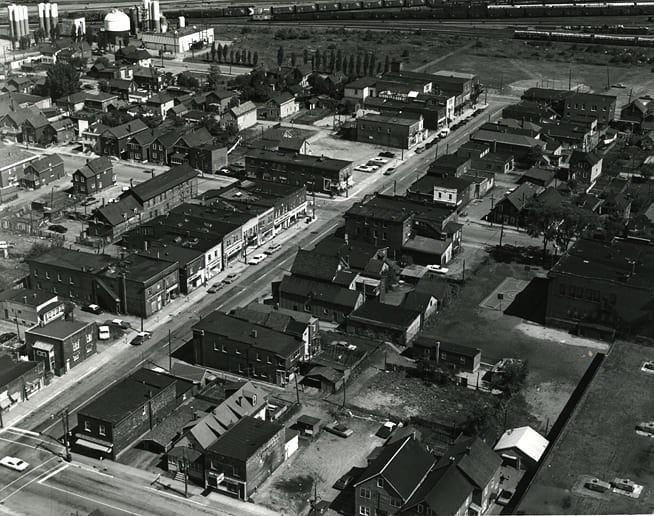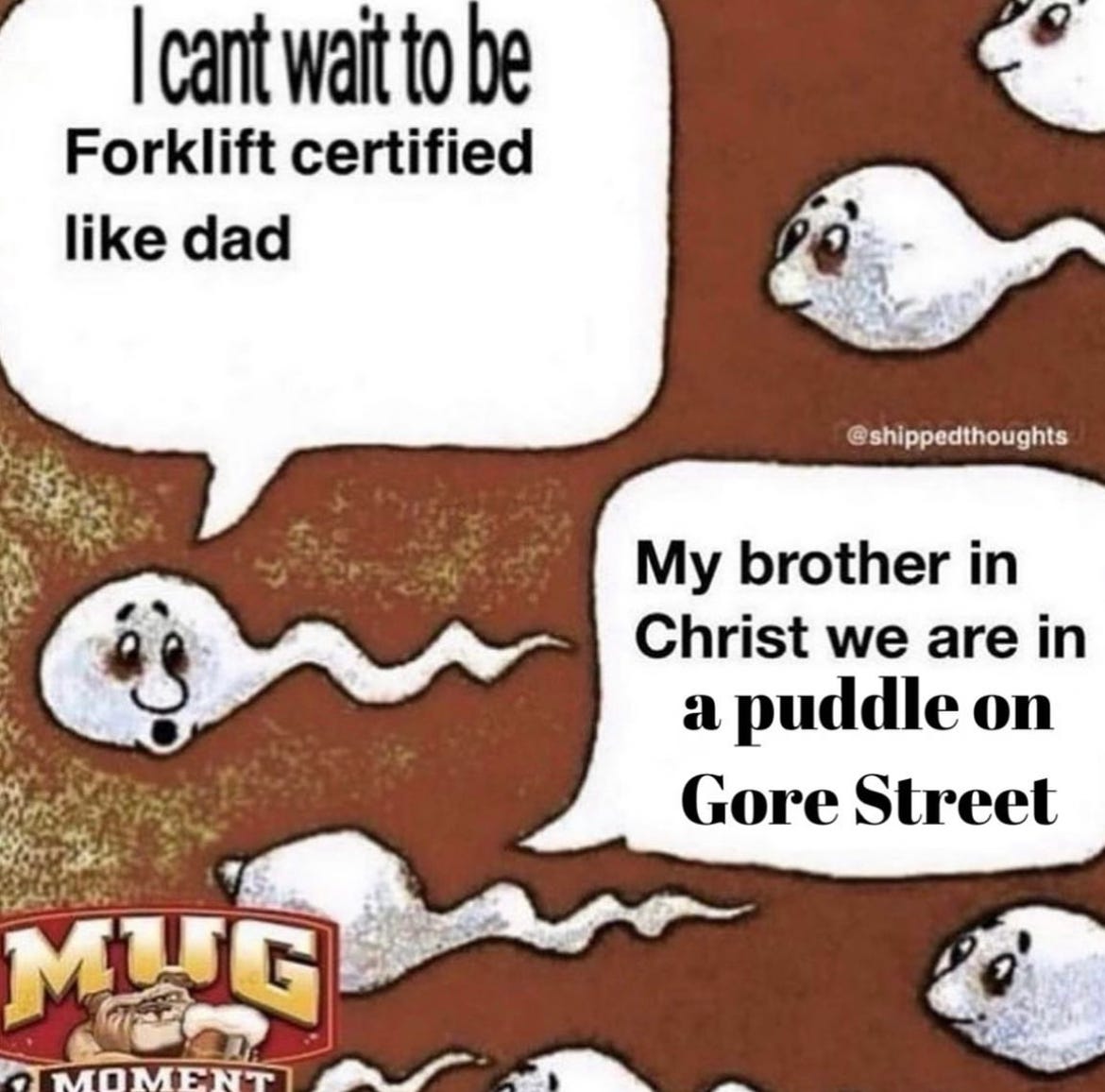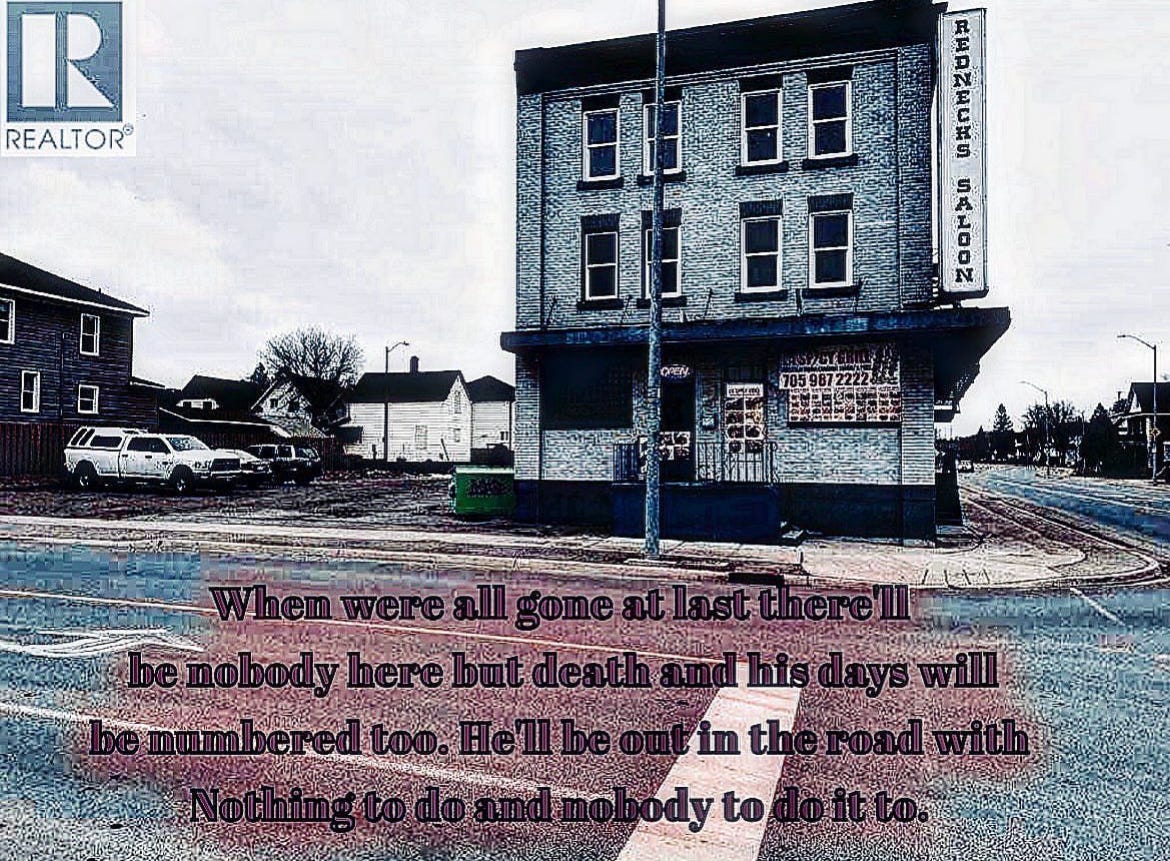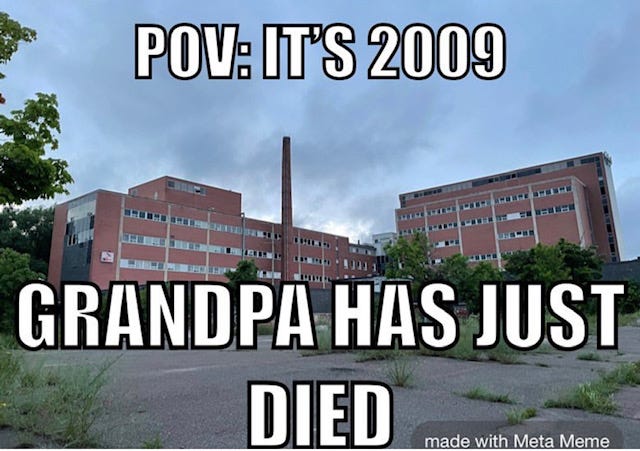I write about time primarily because I am interested in its relationship to place and memory.
When I was 20-years-old I returned to my hometown of Sault Sainte Marie for the summer after two semesters of university in Toronto. Nine months previous I’d vowed to friends we’d live there forever, enjoy the cool fresh wind and six-packs on the golf course—quantities of alcohol we’d thought nullifying enough, then. I told incredulous dorm roommates that Sault Ste. Marie was the best place in the world. They had said, “You need to get out more.”
My problem is that I got out just long enough to become aware of the insular-suffocation theme common to Proust and small towns. This is more pronounced in the Sault, where the nearest major centre is Sudbury, three hours south, once described, perhaps unfairly, by CNN as a “wasteland” due to its industrially-wrought acid rain epidemic, and where NASA astronauts trained because it purportedly “resembled the lifeless surface of the moon.”
Eager on this Desolation Row not to bow to the consensus, but to be famous for playing the electric violence of Serious Ideas, it became apparent no such validation was forthcoming at O’Aces, our Handshake Room; or The Princess, our dance department store. And so I lashed out like an inconsolable Bauby wailing that he wants to play semantic Concentration when his mother suggests he be locked into a diving bell so as to see yet more of Lake Superior.
I gesticulated on small dance floors to signify that despite conflicting popular opinion, I was bigger than and existed external to the town’s little gestell. That all the ardour of our identity could be reframed by boarding even a Greyhound bus. “None of this matters as much as we’ve been led to believe,” I shouted at those I’d shared my life with, feeling like Plato’s cave returnee, a single David Chalmers essay on THE MATRIX shoring up my philosophical bona fides.
I the self-signified heretic, THE WILD ONE, held my middle finger in a life-long friend’s unblinking visage long after he’d made verbal and physical responses I’d correctly understood to mean stop, please stop, do please stop, and O do please stop with this petulance if I wished to remain respectable amidst peers whose company I’d ever-so-recently oh-so loved. Peers with whom the first happy 19 years of my life were spent. Peers with whom I might have existed in a cave, but the cave was womb-like, a place to gestate while eating multi-layered dips and a regionally-specific chip-like foodstuff called Pasta Snacks, a cave the wind could still whistle into. What I sacrificed were not just friends, but all that shared language, that way of being, that short-hand: that total understanding of who everyone was in context to who everyone else was—something that can be suffocating, but not so easily replaced either.
I have never quite recovered from those lashings. The next summer I did not return. I still live like misplaced organs still pumping blood and producing vitriolic waste, but lacking the Sault Body Shop-vac that absorbed the extrinsic purposes of these functions.
And then one day the Greyhound returned me to Trunk Road, and the Sault as I knew it looked like it was Going, Going Gone. The infrastructure was still there; the feeling of the Soo was not. And so I’ve spent the last ten years fictionalizing my Frankenstein’s monster of Sault Ste. Marie hoping to be saved by the monster I create. I have erred on the snide side, such as my award-nomenclated short story Sault Ste. Marie is an Equality Brand Cheese Stick that readers may cherish the memory of not having read in Mud Hut, or later when it was reprinted in Unread Online Periodical. As time passed, I sought to pay a more nuanced tribute to the little town at the foot of the rapids we had all grown to love and grown to abandon. I wrote The Many Fentanyl Addicted Wraiths of Sault Sainte Marie to honour the Sault, but also to exorcise its influence upon my dreaming and WAKING LIFE. Perhaps this is not even the paean of lost friendship and lost understanding I thought it was, but only the paean of lost youth.
This tiresome personal history may provide some context for my interest in the Gore Street Grime Instagram account, and the young person who runs it. It takes a lasher to know a lasher. It takes a Deleuzeonal would-be-wonk to feel the spatio-temporal dislocation of destinerrance. His resentments were my resentments, though through some grace I lacked the awareness to know them as ressentiments quite so soon in life.
Mike Sauve: Big fan of your Gore Street Grime Instagram account. It serves a vital purpose in satirizing certain dismal aspects of the Sault Ste. Marie lifestyle that have historically gone unsatirized, which to me is a bigger problem than people might realize. Though many a Saultite possesses a gallows humour commensurate to the facts on the ground, the official channels remain Pollyannaish as ever. My stock joke for a typical headline at The Sault Star during my time there was “Day at the beach enjoyed by all.” What motivated you to start the account?
Gore Street Grime: I’d say I was motivated primarily because I had a history with memes — I made memes about my old high school, Korah Collegiate, nobody really knew who I was but everyone knew my memes, I liked the anonymity of it. I started making memes about the Soo because I noticed that someone else had gained tremendous popularity making content about the Soo and figured I could do better. I haven’t necessarily done any better, but I try to stay up to date with the latest cringe-pool that surfaces in the trends. At the time it seemed imperative to shine the comedic mirror up to the Soo, no matter how distorted or grotesque its reflection may be. It has a tendency to take itself all too seriously, the locals, the authorities, the politicians, the businesses — even the drunks, like bad actors in a TV show when they act serious but it doesn’t feel sincere because everyone knows they’re a joke. It maintains this through a vast web of “John Smith knows Alice and Alice knows Dave who knows John Smith”: a kind of socio-symbolic order that rewards good behaviours and alienates the one’s that it breaks. I would rather commit a crime in a huge metropolitan area than in Sault Ste. Marie for that reason very reason. At the end of the day it’s just another city that eats where it shits. My motivation is to tear down that layer and expose the real.”
Mike: I showed some of the memes to my dad who’s lived in the Sault most of his life and he thought they were hilarious. My mom, on the other hand, said, “Who puts that one there,” and by there she meant The Internet. Do you worry about offending anyone?
Gore Street Grime: Actually I do worry about offending people. I’ve had a few people message me about that. Whenever this happens I usually side with the plaintiff and delete it, but this has only happened twice. Usually I try to be as utilitarian as possible, although I’m sure many of my posts go completely offended but unreported. If everyone was offended by everything I posted I’d probably just quit or evaluate where I went wrong.
Mike: Why mix Heidegger or Cormac McCarthy quotes with the ‘lower’ cultural medium of memes? Is it a way to bring literature and philosophy to a wider audience in a more digestible format? Or do you see these quotations as correlating to the daily lived experience in Sault Ste. Marie?
Gore Street Grime: I find the works of Cormac McCarthy to fit right in to the squalor that persists at the material conditions of Sault Ste. Marie, you could place Suttree at the core of Jamestown and it would be seem to be effectively isomorphic. Additionally, Cormac just happens to be my favourite author of all time. On the other hand, I despise Heidegger as a writer, he is without a doubt one of the worst writers I’ve ever encountered, but I enjoy applying some form of his phenomenology to the way the Soo discloses itself to me and to those who find themselves thrown into it.
Mike: Sounds to me like the impudence of a young scholar and gentleman who has not read past Being and Time, which can be just wildly obtuse at times, such as the entire page devoted to how a turn signal signifies something. Heidegger’s books on Nietzsche and Kant are much more lucid and clearly-written than Being and Time, however. And speaking of turn-signals, the post-turning Heidegger such as On the Way To Language; Poetry, Language, Thought; and The Question Concerning Technology are full of evocative writing. Take this from What are Poets For?:
To be a poet in a destitute time means: to attend, singing, to the trace of the fugitive gods. This is why the poet in the time of the world's night utters the holy. This is why, in Holderlin's language, the world's night is the holy night.
Or this from Language in the Poem:
For the longest times-before it comes to be said, that is, spoken-the poet's work is only a listening. Apartness first gathers the listening into its music, that this music may ring through the spoken saying in which it will resound. The lunar coolness of the ghostly night's holy blue rings and shines through all such gazing and saying. Its language becomes a saying-after, it becomes: poetry. Poetry's spoken words shelter the poetic statement as that which by its essential nature remains unspoken. In this manner, the saying-after, thus called upon to listen, become "more pious," that is to say, more pliable to the promptings of the path on which the stranger walks ahead, out of the dark of childhood into the stiller, brighter earliness.
Or this,
True time, however, is the arrival of that which has been. This is not what is past, but rather the gathering of essential being, which precedes all arrival in gathering itself into the shelter of what it was earlier, before the given moment. The end and accomplishment has its analogue in "dark patience." Patience bears hidden things toward their truth. Its forbearance bears everything toward its descent down into the blue of the ghostly night.
I believe this is what I’d needed to say, or hoped to convey at The Handshake Room. I can see now how it is perhaps better that I could only gesticulate obscenely instead.
Gore Street Grime: I haven’t read much of his work on poetry, just scanty summaries, but I can vaguely see how it fits in with his work on technology and language of non-domination. That said I suppose the memes fit into this category, although I would hope they don’t impose any facticity on people, rather I aim to critique the facticity and signify, like those damn turn signals, the ways in which people in the Soo inauthentically take care. In a certain sense, the memes I make have opened me up to a kind of uncanniness, and I hope to make other Soo Daseins feel this way. My goal is essentially to rob everyone of their everydayness by disclosing to them how the Soo may un-conceal itself in the form of its occasionally abominable and grotesque they-self. What kind of idle talk is imposes itself on the Tim Hortons regulars at the corner of second line and great northern? How might one identify its nuances? What does it signify about the Soo’s facticity and how does one escape it, if one wants to? Every time I return to the Soo I can feel myself falling back into it; sometimes I’m overcome with the urge to purchase a beater truck — an imperative staple of Soo life no doubt, but as soon as I move back to southern Ontario for school it vanishes. I wouldn’t make any moral claims about it, but it’s just there, as a lifestyle fused out of the crucible between Huron and Superior: the Lock city, and lest we forget the steel plant that denotes nature, at long last, as resource and resource alone. The reality in the Soo is that the lost question of Being: the mysterium tremendum, is replaced with the industrial being alienated from other possibilities; the truck boys are often truck boys and nothing else, til death do them apart.
Mike: Bold goal, bro! Reminds me darkly of my younger self. Certainly for a spell I had two personalities. Toronto Mike and Sault Mike. Sault Mike spoke with a little more bass in his voice. He pretended to know a little more about hockey than he actually did. In fact, pretended he did not actively hate the sport of hockey for imposing such a ridiculous dominance hierarchy that hindered his highest adolescent romantic aspirations. That said, I think you are being a little unfair to truck enthusiasts. I would wager that many of them know an inner peace that friends of this blog Simon Critchley and John Searle may never know.
As to the Sault’s raw natural power as standing reserve—what happens when the reserve has been fully extracted but the infrastructure remains in place?
Gore Street Grime: I could be mistaken but I recall that you mentioned you went to high school at St Mary’s: the school that ground up young meat and churned out whole rabbles of hockey players as if it were their primary commodity. I personally know very little about Hockey, far less than the average Canadian no doubt. Not to incite some ressentiment, but I often wonder where those grade 12 hockey legends are today: chewed up; burnt-out; and slowly tumbling down the monkey-tower, long expired. I definitely envy the truck guys more than the old hockey rags. Maybe I am too hard on the truck lifestyle. I suspect if I settle in the Soo after completing my education I’ll have to embrace the lifestyle. I suppose when the standing reserve is completely gone we just become a totality of confused beings locked away from the possibility of being anything other than instruments. In the Soo I guess this is already the case for many who have nothing else to “take care” of but the lifestyle of a heavily industrial city. Generations of people who’ve lived and died in the belly of the steel plant, fathers, grandfathers, great grandfathers, etc. The Soo is of course a blue collar city, it always has been and in no way am I claiming that this is a bad thing or that there’s anything wrong with it, but there does seem to be a heavy inclination in the schools to reduce struggling students to potential steel workers or tradesmen. Every guidance counsellor wants to know that burning question: what’s the instrumental value of your philosophy degree? In the Soo, the standing reserve is just that. The Sault Ste. Marie ideology is one that has already reduced its subjects to objects, but there is hope. I can sense something in the youth a few years younger than myself, as well as an odd shift towards philosophy. A former professor of mine recently told me how popular philosophy courses have become in recent years. I’d like to think that there’s a new sort of revolution coming. One that is critical of instrumental-being, and one that opposes culture as a commodity, ushered in as a new kind of jazz or psychedelic: the antidote to our alienated and dogmatic ways of being in the world. Perhaps slowly returning to the question of and the mystery of Being and the possibility of other ways of being.
Mike: You seemed astounded when I mentioned that the Station Mall had been the hub of adolescent social life in the late 90s, packed with all one’s most winsome Gr. 9 crushes come the old Yuletide, when the parking lot genuinely was “a madhouse” as the men said then, and might still say now even if it’s no longer true. This vertex of time and place is what’s missing for so many people my age (39) who thought they’d said goodbye to SSM only for Wolfean horror to dawn and encompass upon realizing that You Can’t Go Home Again. There has always been cynicism among the Sault’s young people, but do you feel like there is still a sense of place there for people your age to miss if and when you leave?
Gore Street Grime: Every time I leave the Soo it always calls me back from, dare I say, a place of uncanniness or something of the sort. Although lately it’s been less and less as I’ve slowly become more suspicious of its culture and community. Regardless there will always be a nostalgia to it that I think most lost Saultite’s share. There is a quote by Cormac McCarthy that I believe perfectly encapsulates the ambivalence of Sault Ste. Marie’s youth: “Nobody wants to be here, and nobody wants to leave” which, now that I think of it, will probably be used in a future meme. Personally my own history is deeply entangled with the city, but I’m gradually letting it go — what constituted my history with it was of course not just the already doomed structural edifice, not the roads, but the events on those roads that contributed to what the egg-men of the city all one day declared: the end of an era — the last moonlit joyride prowling the streets with a sentiment long gone. The being-towards-the-Soo has moved from the sentiment carried throughout Kerouac’s On The Road, to his Dharma Bums; the move from a dopamine-Dean Moriarty-being to a mountain-top-serotonin-being if one could ever reduce it to that. Whatever I miss about it is gone, save for the memories that I haven’t produced a narrative for. Right now they border on a time in my life that brought out the worst in me but also a time [that] reminds me to affirm life. Some people, often the old folk, like to paint the narrative one way or another with the concept of maturity but I’m dubious of anyone who uses that term to make ought statements about how one should be in the world, especially those who’ve lived in the Sault their whole lives and at long last loudly proclaim that they have reached maturity, which ultimately just seems tantamount to living in the P-patch. I don’t know if I can speak for the other early twenty year olds who leave the city, but personally it feels like you can either attempt to maintain what was lost until one day you wake up and realize those days are gone and you’ve slowly been assimilated into life in MillCreek or wherever the concept of maturity issued from, or you can become a regular at Misty’s Fifty’s or Loplops, a four-time divorcee math teacher doomed to chase the next thrill behind the wheel of a booze cruiser tearing up every single lawn in MillCreek only to wake up and find your face in a place worse than jail: Sootoday. A false dichotomy no doubt, but a possibility to all those who find themselves creeping all too close to the thrill of their lost youth. The place is still there, Great Northern Tims will be around for decades to come, but whether it feels like it’s a place to meet with friends when there’s nothing else to do or whether it’s now just a place to grab a coffee — nowadays I’d say it’s just the latter.”
Mike: Do you plan to return to the Sault once you’ve completed your education? I have committed a certain heresy, writing several books with a sharp satirical edge about a place that’s missing for me while still very-much-present to others. Even if that edge comes from a place of care and concern, I do experience guilt, i.e., “Who exactly appointed me the Jonathan Swift of this situation?” Do you think you could continue the Gore Street Grime account while living elsewhere?
Gore Street Grime: I don’t know where I’ll end up when I finish my education. For a while I thought I’d absolutely return to the Soo, but part of me feels that I’ve burned too many bridges and left behind me a wake of charred and smoking ruins upon the grave of my degenerate adolescence, although I’m sure many share this concern. It is, after all, a tightly knit community. Everyone knows everyone; there is a kind of panoptic machinery in which you can almost feel yourself being watched by no one in particular. I’m much happier when I’m outside of the city limits within which the attitude is social-dopamine. I’d rather aim for somewhere north of 17. I don’t know where I’ll end up, either in some reclusive corner, Michipicoten or Goulais River or maybe none of those places. If I’m not living in the Soo, then I think I’ll gradually withdraw from Gorestreetgrime, not because I have a problem committing epistemic heresy, but because if I’m not living there anymore then I’d rather let the dust settle. I also absolutely despise social media and the way it’s shaped society — Marshall McLuhan hit the nail with that one, but the predicament of the youth is that we can’t live without it but with it we are doomed. I’ve been slowly deleting all of my social media over the last year or so and already my life has become exponentially better. I usually delete my Instagram from my phone on a daily basis and then redownload it to post a meme. At some point I’ll bid farewell to all of my followers who I haven’t seen in years and that will be that. But nobody wants to say goodbye to those people they won’t see again. Social media opens up the possibility that you might see them again, but the odds are bleak, and someday, maybe not today, maybe not tomorrow, but someday, I will close that door forever, “see you when I see you” will be the motto of tomorrow’s counter-culture.









